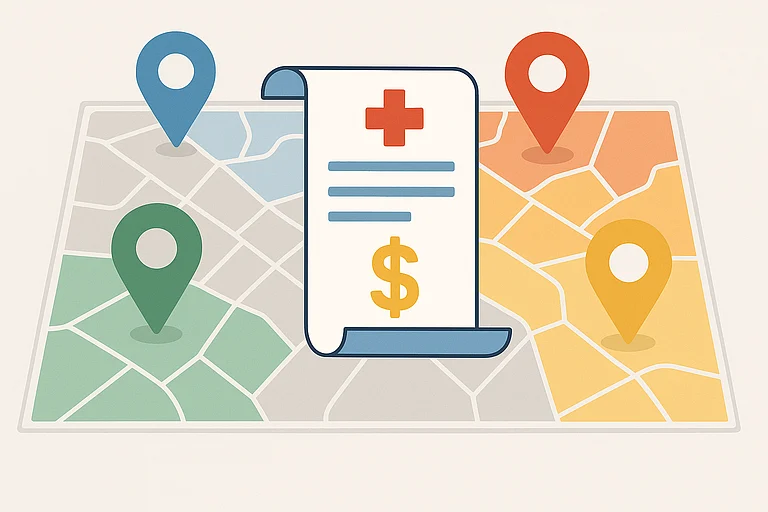A man from Silvassa, a city in Dadra and Nagar Haveli district, recently landed in a consumer court because his health insurance claim was rejected, over what his Google Timeline showed.
Vallabh Matka had taken a mediclaim policy from Go Digit General Insurance. In September 2024, he was admitted for viral pneumonia at a private hospital in Silvassa for four days. Once he recovered and submitted his bills for reimbursement, the insurance company turned down the claim. Their reason? His Google Timeline did not match the hospital location.
The insurer said that Matka claimed he had his phone during hospitalisation, but Google Timeline did not show him at the hospital. They also pointed to inconsistencies in documents and his own statements. Left with no option, Matka approached the district consumer forum in Valsad.
After reviewing the records, the forum was not convinced by the insurer's argument. It was found that the hospital documents supported Matka's version, and even the insurance company's own report admitted that he had been admitted and treated.
In a judgment passed on July 14, forum president B.G. Dave said it appeared the company was simply trying to avoid settling the claim. The forum ordered the insurer to pay Rs 48,251 with 8 per cent interest within 30 days.
What Exactly Is Google Timeline?
Google Timeline (formerly Location History) is a feature that tracks the places a person visits using GPS data from their phone. It can be useful for remembering trips or routes, but it is far from perfect. The data is based on phone signals and app permissions. If location tracking is turned off or if the phone is not with the user, the timeline will be incomplete or inaccurate.
That is what seems to have happened here.
A Similar Story With a Different Ending
This is not an isolated case, a similar issue was flagged by grievance redressal platform Insurance Samadhan in 2023 on their website. In that instance, a policyholder named Praveen Kumar had his claim rejected because the Google Timeline from his phone showed he was regularly at work, not in the hospital, during the supposed admission days. His claim was denied for "misrepresentation of facts." No word on whether he took it up with a consumer forum, but the story reflects a growing trend.
Insurers are beginning to look at smartphone location data to verify claims. And sometimes, they are using it as the main ground to deny them.
But can insurers use Google Timeline to reject your insurance claim?
In a LinkedIn post, Hari Radhakrishnan, a chartered engineer, insurance broker and certified arbitrator recently explained the use of personal digital data (PDD) for insurance claims such as google timeline.
So can the insurer seek personal data for any kind for claims adjudication? The answer is yes. Any claim typically requires personal data sharing in either physical or digital form, especially if it is a health insurance claim.
"You have to disclose your medical history and treatment records which are private to you. If a position is taken that no private data, including PDD, should be shared, then no claim can be processed or paid. Doctrine of impossibility or contract frustration will kick in," Radhakrishnan stated.
However, the key factor lies on the lawfulness of how PDD was accessed by the insurer or its agents/investigators. "If the Google timeline was accessed without proper consent or due process, then the evidence becomes what in legal parlance is called 'fruit of the poisonous tree'. The claim decision in such a case may not stand legal scrutiny," Radhakrishnan noted.
The Problem With Relying on Location Data
It might seem reasonable at first, location data as a way to cross-check claims. However, there are real problems with using it as primary evidence. Phones are often left with family members during a hospital stay.
People may turn off location tracking for privacy, or the device may simply lose GPS signal. None of these things proves whether someone was or wasn't hospitalised.
And, as seen in Matka's case, these digital logs can be mistaken. What they cannot replace are formal hospital admission records, bills, prescriptions, and discharge summaries.
What This Means for Policyholders
The court's order is a reminder that insurance companies cannot rely solely on tech-based tools to deny valid claims. It sets an important precedent: Google Timeline is not proof enough to contradict hospital records.
That said, the fact that such rejections are happening means policyholders need to be careful.
If you are hospitalised:
Keep your hospital records safely, admission slips, bills, and prescriptions.
If you give your phone to someone else, especially during treatment, make a note of it.
Make sure your forms are accurate, including seemingly minor details like who was with you, where your phone was, etc.
And if your claim is denied for reasons like this, do not hesitate to push back. You can file a complaint with your insurer first, and if that doesn't help, you can raise a grievance or approach the consumer forum.















